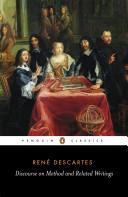Why a Machine Cannot Fully Imitate a Man
I specifically paused to show that, if there were such machines with the organs and shape of a monkey or of some other non-rational animal, we would have no way of discovering that they are not the same as these animals. But if there were machines that resembled our bodies and if they imitated our actions as much as is morally possible, we would always have two very certain means for recognizing that, none the less, they are not genuinely human. The first is that they would never be able to use speech, or other signs composed by themselves, as we do to express our thoughts to others. For one could easily conceive of a machine that is made in such a way that it utters words, and even that it would utter some words in response to physical actions that cause a change in its organs—for example, if someone touched it in a particular place, it would ask what one wishes to say to it, or if it were touched somewhere else, it would cry out that it was being hurt, and so on. But it could not arrange words in different ways to reply to the meaning of everything that is said in its presence, as even the most unintelligent human beings can do. The second means is that, even if they did many things as well as or, possibly, better than anyone of us, they would infallibly fail in others. Thus one would discover that they did not act on the basis of knowledge, but merely as a result of the disposition of their organs. For whereas reason is a universal instrument that can be used in all kinds of situations, these organs need a specific disposition for every particular action.
Notes:
Descartes reasoning sounds like a precursor to the Turing Test.
Folksonomies: artificial intelligence
Taxonomies:
/religion and spirituality/christianity/catholicism (0.577878)
/family and parenting (0.444434)
/family and parenting/children (0.403368)
Keywords:
unintelligent human beings (0.933042 (negative:-0.526797)), non-rational animal (0.811830 (neutral:0.000000)), certain means (0.787770 (neutral:0.000000)), Descartes reasoning (0.763206 (positive:0.261327)), physical actions (0.762562 (negative:-0.336712)), specific disposition (0.752391 (neutral:0.000000)), Turing Test. (0.740876 (positive:0.261327)), different ways (0.737876 (neutral:0.000000)), particular place (0.725629 (neutral:0.000000)), universal instrument (0.710040 (neutral:0.000000)), particular action (0.685829 (neutral:0.000000)), organs (0.646988 (neutral:0.000000)), words (0.541171 (negative:-0.336712)), machines (0.490307 (neutral:0.000000)), precursor (0.408180 (positive:0.261327)), monkey (0.408076 (neutral:0.000000)), shape (0.407105 (neutral:0.000000)), animals (0.395402 (negative:-0.402270)), bodies (0.393182 (neutral:0.000000)), speech (0.389844 (neutral:0.000000)), signs (0.389730 (neutral:0.000000)), thoughts (0.389415 (positive:0.323629)), meaning (0.387563 (neutral:0.000000)), example (0.386881 (negative:-0.336712)), presence (0.386367 (neutral:0.000000)), situations (0.386010 (neutral:0.000000)), result (0.385854 (neutral:0.000000)), machine (0.385334 (neutral:0.000000)), response (0.384731 (negative:-0.336712)), change (0.384539 (negative:-0.336712))
Entities:
Turing Test.:FieldTerminology (0.833681 (positive:0.261327))
Concepts:
Meaning of life (0.957743): dbpedia | freebase | yago
Human (0.796923): dbpedia | freebase | opencyc
Cognition (0.763110): dbpedia | freebase | opencyc
Thought (0.689929): dbpedia | freebase | opencyc
Reason (0.645852): dbpedia | freebase
Metaphysics (0.609502): dbpedia | freebase | opencyc
Animal (0.602885): dbpedia | freebase | opencyc
Language (0.562021): dbpedia | freebase | opencyc

Triples
 Evolving Philosophy on Machines Imitating Humans
Evolving Philosophy on Machines Imitating Humans
Why a Machine Cannot Fully Imitate a Man > Comparison > The Imitation GameDescartes thought it impossible for a machine to replicate a human because machines can't learn. Turing lived in a world where machines can learn, so he invented the Imitation Game to determine how well a machine could think.




